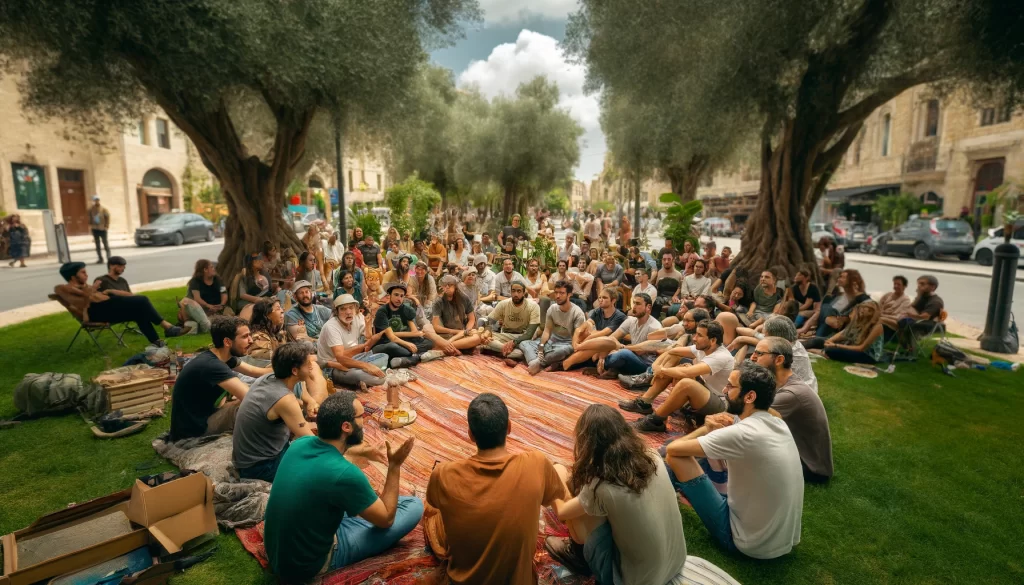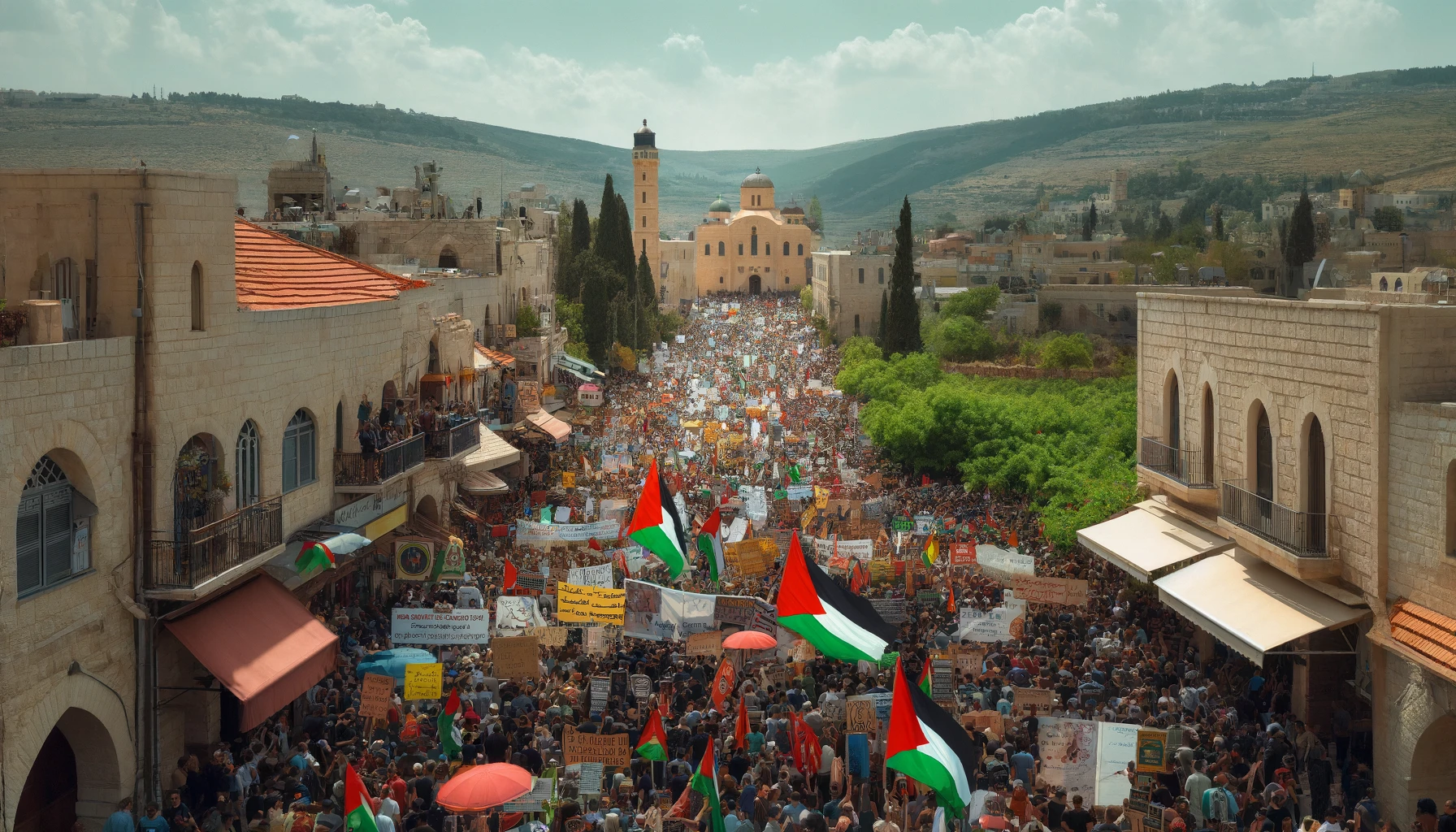In Deir Hanna, a town nestled in Israel’s Galilee region, a remarkable event unfolded one sunny Saturday afternoon. Hundreds of individuals, representing a diverse tapestry of the community, came together in a peaceful march. This wasn’t just any march; it was a loud, vibrant protest against the ongoing war in Gaza, a conflict that had already stretched on for six months. What made this gathering especially significant was its occurrence in the wake of a tragic event: a brutal attack by Hamas last October that claimed the lives of 1,200 people.
The aftermath of this attack saw a stringent crackdown on anti-war sentiments across Israel. Reports surfaced of Palestinian citizens of Israel being detained for attempting to attend vigils—a basic form of peaceful protest that, by law, does not require official permission. Legal aid organizations highlighted the harsh realities faced by hundreds: incarcerations, loss of employment, suspensions from educational institutions, and disciplinary actions, often triggered by social media posts that dared to question the invasion of Gaza.
This context makes the march through Deir Hanna all the more extraordinary. Despite a police ban on the Palestinian flag, demonstrators, including 25-year-old Haj Amir, boldly carried it, symbolizing their hope for an independent nation.
The march was part of the annual Land Day commemorations, a tradition rooted in Palestinian resistance to Israeli land expropriation. This year, however, it also served as a platform for voicing opposition to the Gaza war. Participants like Nagm Madi, who attended with her young children, seized this opportunity to express their longing for peace and to challenge the narrative of extremism that often shadows Palestinian voices.
Palestinians in Israel, who constitute 20% of the nation’s population, frequently find themselves marginalized, grappling with economic disparities, limited job prospects, and insufficient investment in their communities. The war in Gaza has only intensified these challenges, making expressions of solidarity with Palestinians in Gaza both perilous and fraught with consequences.

Madi’s story is a case in point. Her sister, a university student, faced disciplinary review for months over a social media post featuring a poem by Mahmoud Darwish, the revered Palestinian poet. Another sister encountered criticism at work for simply changing her profile picture to a black image, mourning the devastation in Gaza.
Despite these obstacles, legal aid groups have continued to fight for the right to protest, navigating a complex legal landscape to secure permits for anti-war demonstrations. Yet, the struggle is far from over, with Palestinian rallies often subject to stringent conditions that limit their visibility and impact. The suspension of a Palestinian professor from Hebrew University for her critical remarks on the war in Gaza highlights the ongoing challenges to academic freedom and free speech.
For individuals like Shahd Bishara, a pathologist living in Tel Aviv, the war has personal implications. In the tense initial weeks of the conflict, Bishara feared speaking Arabic in public, concerned for her safety amid the heightened hostility. The memory of previous clashes between Israeli Jews and Arabs lingered, casting a shadow over her daily life. Yet, despite these fears, Bishara found solace and strength in solidarity, working with groups that advocate for a ceasefire and humanitarian relief for Gaza.
The recent relaxation of gun laws in Israel, following the Hamas attack, has added another layer of anxiety for Palestinian citizens like Bishara. The distribution of new gun licenses, seemingly excluding Arab communities, symbolizes a growing militarization that many fear targets them directly.
As Bishara reflects on the state of affairs, she recognizes the critical juncture at which Israeli Jewish and Palestinian citizens find themselves. “I’m not sure to which direction it’s going to change,” she says, “but we’re definitely going to witness a new era after this war.”
This article is based on the following article:

Background Information
By understanding these key elements, readers can better appreciate the complexities and sensitivities surrounding the events described in the article. It highlights the challenges of advocating for peace and justice in a region marked by deep divisions and ongoing conflict.
The Israeli-Palestinian Conflict
The Israeli-Palestinian conflict is a long-standing and deeply complex dispute with roots in the late 19th and early 20th centuries. It primarily involves two groups: Jewish Zionists, advocating for a homeland for Jews in the territory then known as Palestine, and the Arab Palestinians, who have historically inhabited the land. The conflict intensified in 1948 with the establishment of the State of Israel and the subsequent Arab-Israeli War, leading to the displacement of hundreds of thousands of Palestinians in what is known to them as the Nakba, or “catastrophe.”
Palestinian Citizens of Israel
Palestinian citizens of Israel, sometimes referred to as Arab Israelis, make up about 20% of Israel’s population. They are descendants of Palestinians who remained within Israel’s borders following the 1948 Arab-Israeli War. While they have citizenship and can vote, many report experiencing social, economic, and political discrimination. Issues include disparities in education, housing, employment, and representation in public life.
Land Day
Land Day, observed on March 30th annually, commemorates the events of 1976, when the Israeli government announced a plan to expropriate thousands of dunams of land for state purposes, much of it owned by Palestinian citizens. Protests and a general strike were organized in response, leading to clashes with the Israeli police and the deaths of six Palestinians. Land Day has since become a symbol of Palestinian resistance against Israeli policies and a day of solidarity among Palestinians worldwide.
The Gaza Strip
The Gaza Strip is a small coastal territory bordered by Israel, Egypt, and the Mediterranean Sea. Governed by Hamas since 2007, Gaza has been under an Israeli-Egyptian blockade, significantly restricting the movement of people and goods, which Israel says is necessary to prevent Hamas from obtaining military resources. The conditions in Gaza are dire, with significant humanitarian issues.
Protests and Freedom of Expression in Israel
Israel is a democracy that allows freedom of expression, assembly, and protest. However, the country has faced criticism for how it handles protests, especially those by Palestinian citizens of Israel or those concerning the Israeli-Palestinian conflict. Issues such as the detention of protesters, restrictions on the locations and nature of protests, and surveillance of social media have raised concerns about the limits of these freedoms, particularly in the context of national security.
The Importance of Social Media
Social media has become a crucial platform for activists and ordinary citizens to express solidarity, organize demonstrations, and share opinions. However, it also serves as a double-edged sword, where posts can lead to scrutiny, legal consequences, or even job loss, especially for those expressing views critical of the government or military actions.

Debate/Essay Questions
- Should freedom of speech be respected during times of war or national crisis? Can countries afford to allow criticism of their governments when they are engaged in existential conflicts with other countries?
- Should civilians be encouraged or allowed to carry weapons for self-defense in conflict zones? Or does encouraging them to do so lead to new difficulties, such as them not being able to be recognized as civilians but as combatants?
Please subscribe to Insight Fortnight, our biweekly newsletter!
